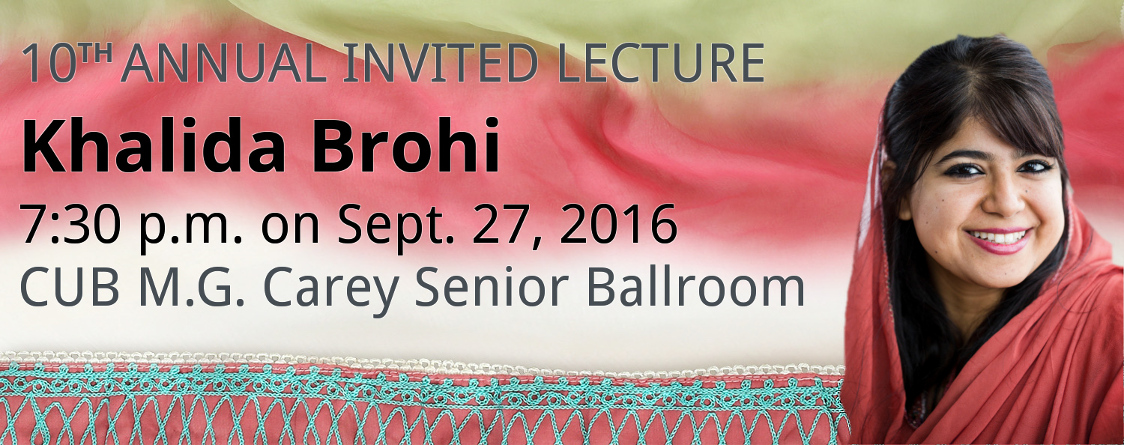
PULLMAN, Wash.—The tenth annual Common Reading Invited Lecture at 7:30 p.m. Tues., Sept. 27 in the CUB M.G. Carey Senior Ballroom will feature Khalida Brohi, Pakistani activist for women’s rights, global speaker, and founder of the Sughar Empowerment Society and Foundation to help educate and empower women. The public is welcome.
“Ms. Brohi is an acclaimed advocate for the improvement of the lives of women in her country, and she works every day to bring positive changes to that nation and its culture,” said Karen Weathermon, co-director of the Common Reading Program, lecture sponsor and a unit of WSU Undergraduate Education.
“Much of her life parallels that of her fellow Pakistani activist, Malala Yousafzai, the author of I Am Malala: The Girl Who Stood Up for Education and Was Shot by the Taliban, this year’s common reading book for thousands of WSU first-year and other students at campuses in Pullman, Tri-Cities, Spokane, and Puget Sound/Everett, and the Global Campus,” said Susan Poch, program co-director.
“We are honored to welcome Ms. Brohi to speak from personal experience on topics that are important to both as well as to the modern world.”
Brohi will visit with Pullman students, faculty, and staff throughout the day of the lecture. Following the presentation, she will travel to WSU Tri-Cities to meet with students and deliver another lecture Wed., Sept. 28, evening.
Brohi, Sughar, and Social Entrepreneurship
As a teenager in Pakistan, Brohi witnessed the honor killing of a friend who had married for love instead of a family-approved choice. Following her father’s advice of “Don’t cry, strategize!,” the honor-killing experience inspired her to plan and organize a vehicle to empower women. Realizing protest alone would not impact women’s lives, she founded and directs the Sughar Empowerment Society, a nonprofit organization supporting rural and tribal women in Pakistan to improve their quality of life by empowering them socio-economically, emotionally, and intellectually. She is also the chief visionary officer of the Sughar Foundation.
Brohi has set a goal to impact through her organizations the lives of one million Pakistani women. “Sughar” means “skilled and confident woman” in the Urdu language spoken there. Women served by the Empowerment Society get income from their work—often embroidery of fine fabrics to be used in the fashion industry—as well as the ability to “challenge negative cultural beliefs with education and information about women’s rights.”
Award-Winning Acclaim
Among Brohi’s many honors is her recognition in 2014 as a “Forbes 30 Under 30” top young world leader in the social entrepreneurship category, honoring those who leverage business tools to improve the world.
She has been profiled in such media as The Daily Beast, the Huffington Post and NBC News, and delivered a TEDtalk in 2015 titled “How I Work to Protect Women from Honor Killings.”
She has been named one of Newsweek magazine’s “25 under 25” and one of the “100 Women Who Matter in Pakistan;” awarded the “Woman of Impact Award” by the Women in the World Foundation, the Women Excellence Award by national Government of Pakistan; the Young Champion Award from the University of Singapore; and the Unreasonable Institute Fellowship Award. Brohi has addressed numerous global forums, and has received recognition from Oprah Winfrey, CNN correspondent Christiane Amanpour, and the former American President Bill Clinton.
Giving Back
Brohi and her husband, David Barron, own and operate The Chai Spot in Sedona, Arizona. Specialty tea drinks are served and sales displays feature handmade home and fashion goods produced by women in a dozen villages in the Sindh and Balochistan provinces in Pakistan. Fifty percent of the business’s profits go into projects supporting women and children in Pakistan, according to the website.
Common Reading Aligned with WSU Grand Challenges
The two-year “leadership and social justice” theme of the WSU-wide common reading initiative is in keeping with WSU’s Grand Challenges, a suite of initiatives aimed at large societal issues. It is particularly relevant to the challenge of advancing opportunity and equity. The Common Reading also advances student knowledge of WSU research by inviting faculty- and guest-experts to make presentations to first-year and other students on their work as it relates to topics in each year’s selected book.
Common Reading in Pullman
The Common Reading Program began in Pullman in 2007 to help students, their teachers, and the community better engage in academically centered critical thinking, communication, research, and learning around a body of shared information presented in a single, specially selected book. In addition to the book’s use in many first-year and other courses in fall and spring semesters, the book presents topics that lend themselves to a wide variety of year-long and robust programming. There are film showings, special events in residence halls, and popular faculty and guest expert lectures that often draw from the speaker’s own research.
Contacts:
Karen Weathermon, Co-Director, Common Reading Program, WSU Undergraduate Education, 509-335-5488, kweathermon@wsu.edu
Susan Poch, Co-Director, Common Reading Program, WSU Undergraduate Education, 509-335-6037, poch@wsu.edu